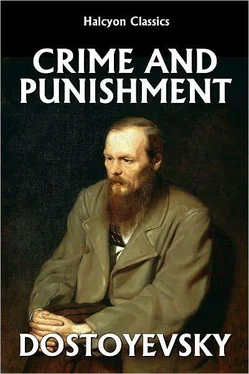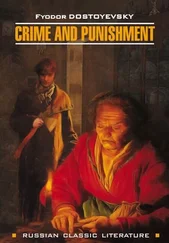He was so badly dressed that even a man accustomed to shabbiness would have been ashamed to be seen in the street in such rags. In that quarter of the town, however, scarcely any shortcoming in dress would have created surprise. Owing to the proximity of the Hay Market, the number of establishments of bad character, the preponderance of the trading and working class population crowded in these streets and alleys in the heart of Petersburg, types so various were to be seen in the streets that no figure, however queer, would have caused surprise. But there was such accumulated bitterness and contempt in the young man's heart, that, in spite of all the fastidiousness of youth, he minded his rags least of all in the street. It was a different matter when he met with acquaintances or with former fellow students, whom, indeed, he disliked meeting at any time. And yet when a drunken man who, for some unknown reason, was being taken somewhere in a huge waggon dragged by a heavy dray horse, suddenly shouted at him as he drove past: "Hey there, German hatter" bawling at the top of his voice and pointing at him—the young man stopped suddenly and clutched tremulously at his hat. It was a tall round hat from Zimmerman's, but completely worn out, rusty with age, all torn and bespattered, brimless and bent on one side in a most unseemly fashion. Not shame, however, but quite another feeling akin to terror had overtaken him.
"I knew it," he muttered in confusion, "I thought so! That's the worst of all! Why, a stupid thing like this, the most trivial detail might spoil the whole plan. Yes, my hat is too noticeable… It looks absurd and that makes it noticeable… With my rags I ought to wear a cap, any sort of old pancake, but not this grotesque thing. Nobody wears such a hat, it would be noticed a mile off, it would be remembered… What matters is that people would remember it, and that would give them a clue. For this business one should be as little conspicuous as possible… Trifles, trifles are what matter! Why, it's just such trifles that always ruin everything…"
He had not far to go; he knew indeed how many steps it was from the gate of his lodging house: exactly seven hundred and thirty. He had counted them once when he had been lost in dreams. At the time he had put no faith in those dreams and was only tantalising himself by their hideous but daring recklessness. Now, a month later, he had begun to look upon them differently, and, in spite of the monologues in which he jeered at his own impotence and indecision, he had involuntarily come to regard this "hideous" dream as an exploit to be attempted, although he still did not realise this himself. He was positively going now for a "rehearsal" of his project, and at every step his excitement grew more and more violent.
With a sinking heart and a nervous tremor, he went up to a huge house which on one side looked on to the canal, and on the other into the street. This house was let out in tiny tenements and was inhabited by working people of all kinds—tailors, locksmiths, cooks, Germans of sorts, girls picking up a living as best they could, petty clerks, etc. There was a continual coming and going through the two gates and in the two courtyards of the house. Three or four door–keepers were employed on the building. The young man was very glad to meet none of them, and at once slipped unnoticed through the door on the right, and up the staircase. It was a back staircase, dark and narrow, but he was familiar with it already, and knew his way, and he liked all these surroundings: in such darkness even the most inquisitive eyes were not to be dreaded.
"If I am so scared now, what would it be if it somehow came to pass that I were really going to do it?" he could not help asking himself as he reached the fourth storey. There his progress was barred by some porters who were engaged in moving furniture out of a flat. He knew that the flat had been occupied by a German clerk in the civil service, and his family. This German was moving out then, and so the fourth floor on this staircase would be untenanted except by the old woman. "That's a good thing anyway," he thought to himself, as he rang the bell of the old woman's flat. The bell gave a faint tinkle as though it were made of tin and not of copper. The little flats in such houses always have bells that ring like that. He had forgotten the note of that bell, and now its peculiar tinkle seemed to remind him of something and to bring it clearly before him… He started, his nerves were terribly overstrained by now. In a little while, the door was opened a tiny crack: the old woman eyed her visitor with evident distrust through the crack, and nothing could be seen but her little eyes, glittering in the darkness. But, seeing a number of people on the landing, she grew bolder, and opened the door wide. The young man stepped into the dark entry, which was partitioned off from the tiny kitchen. The old woman stood facing him in silence and looking inquiringly at him. She was a diminutive, withered up old woman of sixty, with sharp malignant eyes and a sharp little nose. Her colourless, somewhat grizzled hair was thickly smeared with oil, and she wore no kerchief over it. Round her thin long neck, which looked like a hen's leg, was knotted some sort of flannel rag, and, in spite of the heat, there hung flapping on her shoulders, a mangy fur cape, yellow with age. The old woman coughed and groaned at every instant. The young man must have looked at her with a rather peculiar expression, for a gleam of mistrust came into her eyes again.
"Raskolnikov, a student, I came here a month ago," the young man made haste to mutter, with a half bow, remembering that he ought to be more polite.
"I remember, my good sir, I remember quite well your coming here," the old woman said distinctly, still keeping her inquiring eyes on his face.
"And here… I am again on the same errand," Raskolnikov continued, a little disconcerted and surprised at the old woman's mistrust. "Perhaps she is always like that though, only I did not notice it the other time," he thought with an uneasy feeling.
The old woman paused, as though hesitating; then stepped on one side, and pointing to the door of the room, she said, letting her visitor pass in front of her:
"Step in, my good sir."
The little room into which the young man walked, with yellow paper on the walls, geraniums and muslin curtains in the windows, was brightly lighted up at that moment by the setting sun.
"So the sun will shine like this then too!" flashed as it were by chance through Raskolnikov's mind, and with a rapid glance he scanned everything in the room, trying as far as possible to notice and remember its arrangement. But there was nothing special in the room. The furniture, all very old and of yellow wood, consisted of a sofa with a huge bent wooden back, an oval table in front of the sofa, a dressing–table with a looking–glass fixed on it between the windows, chairs along the walls and two or three half–penny prints in yellow frames, representing German damsels with birds in their hands—that was all. In the corner a light was burning before a small ikon. Everything was very clean; the floor and the furniture were brightly polished; everything shone.
"Lizaveta's work," thought the young man. There was not a speck of dust to be seen in the whole flat.
"It's in the houses of spiteful old widows that one finds such cleanliness," Raskolnikov thought again, and he stole a curious glance at the cotton curtain over the door leading into another tiny room, in which stood the old woman's bed and chest of drawers and into which he had never looked before. These two rooms made up the whole flat.
"What do you want?" the old woman said severely, coming into the room and, as before, standing in front of him so as to look him straight in the face.
Читать дальше












